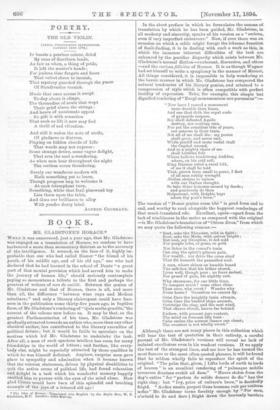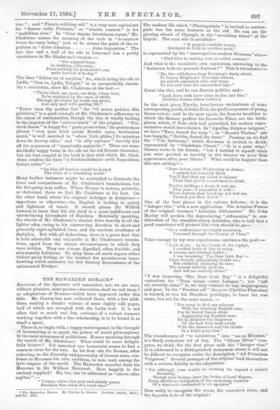BOOKS.
MR. GLADSTONE'S HORACE.* WREN it was announced, just a year ago, that Mr. Gladstone was engaged on a tra.nalation of Horace, we confess to have harboured a more than momentary distrust as to the accuracy of the intelligence. It seemed, on the face of it, highly im- probable that one who had called Homer "the friend of his youth, of his middle age, and of his old age," one who had declared that he had learned in the school of Dante "a great part of that mental provision which had served him to make the journey of human life," should seriously contemplate paying so momentous a tribute to the first and perhaps the greatest of writers of vers ile scei616. Between the genius of Mr. Gladstone and that of Horace, there is all, and more than all, the difference "between wine cups and Median scimitars ; " and only a literary clairvoyant could have fore- seen in the publication some thirty-five years ago, in fugitive form, of Mr. Gladstone's rendering of " Qnis multa gracilis," the earnest of the volume now before us. It may be that, as the greatest Parliamentarian of his time, Mr. Gladstone was gradually attracted towards an author who, more than any other classical author, has contributed to the literary amenities of political debate ; but it would be futile to speculate on the motives which led Mr. Gladstone to undertake the task. After all, a man of such spacious intellect has room for many friendships in the world of letters ; and further, like every- body else, might be especially attracted by those qualities in which he was himself deficient. Anyhow, surprise soon gave place to sympathy and admiration when it became known that the veteran statesman, driven by physical disabilities to quit the active arena of political life, had found relaxation and delight in a task which his wonderful memory happily enabled him to pursue with the eyes of the mind alone. How glad Cicero would have been of this splendid and touching example of the joys of a lettered old age !
• Ths Odes of Horace. Tranplated into Englia by the Right Hon. W. E. Gladstone, M.P. London; Zebu blur r ay. In the short preface in which he formulates the canons of translation by which he has been guided, Mr. Gladstone, in, all modesty and sincerity, speaks of his version as a "serious,. even if very imperfect endeavour." Now, if ever there was an. occasion on which a critic might forego the irksome function of fault-finding, it is in dealing with such a work as this, in which the immense inherent difficulties of the task are enhanced by the peculiar disparity which exists between Mr. Gladstone's normal diction—exuberant, discursive, and otiose —and the ewriosa felieitas of Horace. It is as though Wagner had set himself to write a symphony in the manner of Mozart. All things considered, it is impossible to help wondering at the heroic manner in which Mr. Gladstone has conquered the natural tendencies of his literary genius, and attained to a compression of style which is often compatible with perfect lucidity of expression. Take, for example, this simple but dignified rendering of "Eregi monunsentum tem perennius" :— "Now have I reared a monument
more durable than brass, And one that doth the royal scale of pyramids surpass, Nor shall defeated Aquilo destroy, nor soaking rain, Nor yet the countless tide of years, nor seasons in their train.
Not all of me shall die : my praise shall grow, and never end, While pontiff and mute vestal shall the Capitol ascend, And so a mighty share of me shall Libitum foil.
Where bellows headstrong Aufidus, where, on his arid soil, King Daunus ruled a rural folk, of me it shall be told
That, grown from small to great, I first
of all men subtly wrought Eolian strains to unison with our Italian thought. So take thine honours earned by deeds ; and graciously do thou Melpomene, with Delphic bays adorn thy poet's brow."
The version of "Donee grattts eram tibi " is good from end to end, and worthy to rank alongside the happiest renderings of that much-translated ode. Excellent, again—apart from the lack of nimbleness in the metre as compared with the original —is Mr. Gladstone's translation of" Otium dives," from which we may quote the following stanzas "Rest, asks the Thracian, wild in fight ; Rest, asks the Mode, with quiver bright ; But rest, my Grosphus, is not sold For purple robe, or gems, or gold.
Nor lictor in the consul's train
Can stay the spirit's piteous pain, Nor wealth ; nor drive the cares aloof That flit beneath the pa,nnelled roof. A man, where shines on humble board The salt-box that his father stored, Lives well, though poor : no fears molest,. Nor greed of gain, his nightly rest.
Why strenuous, for our little time, To compass much P some other clime Than ours, why covet P Wander why From home P Ourselves we cannot fly.
Grim Care the knightly train attends,. Grim Care the beaked ships ascends, Outstrips the stag, and the east wind, That chases clouds, leaves far behind.
Eschew, with present joys content, The mind on forecast idly bent : Calm smiles the sourest chance can cheat; The sweetest is not wholly sweet."
Although there are not many pieces in this collection which will bear the test of quotation in their entirety, a careful perusal of Mr. Gladstone's versions will reveal no lack of isolated excellences even in his weakest versions. If we apply the test of the strongest lines, and see how he has turned the most famous or the most often quoted phrases, it will be found that he seldom wholly fails to reproduce the spirit of the original. "The palm that, given, I Lifts lords of earth to lords of heaven" is an excellent rendering of " palmaque nobilis terrarum dominos evehit ad deos." "Hours stolen from the day's entire" for " partem de solido demere de die" has the right ring; but "Ivy, prize of culture's brow," is decidedly frigid. " Audax omnia perpeti Gene humana ruit per vetitum nefas " Mr. Gladstone turns forcibly enough by "For men, o'erbold to do and dare I Right down the heavenly barriers
tear " ; and "Pluto's cribbing cell" is a very neat equivalent for " domua exilis Plutonia," as "nimble runnels" is for " mobilibus rivis." In " Cras ingens iterabimus aquor," Mr. Gladstone misses the meaning of the verb in "to-morrow brave the vasty brine," just as he misses the point of the re- petition in " dulce ridentem dulce loquentem." The last line and a half of the ode to Leucona has a pretty quaintness in Mr. Gladstone's version :—
"The niggard hour,
in chatting, ebbs away; Trust nothing for to-morrow's sun make harvest of to-day."
The lines " felices ter et amplius," &c., which bring the ode to Lydia, "Cum tu, Lydia, Telephi," to so unexpectedly charm- ing a conclusion, show Mr. Gladstone at his best:—
" Thrice blest, aye more, are they, whose love, . Neer sundered by the curse of strife, Through all events its worth can prove, And only part with parting life."
"Fairer than thy mother fair" for "0 matre pulchra film pulchrior," is a good example of Mr. Gladstone's adherence to his canon of condensation, though the line is wholly lacking in the impetus of the " celeres iambi" of the original. "Fro- ward charm" is happy for "grata protervitas," the picturesque phrase " rura quae Liris quieta Mordet aqua, taciturnus amnis" is well matched in "where Liris glides I So noiseless down its drowsy sides," and "in silly sapience" cleverly hits off the oxymoron of " insanientis sapientise." There are some decidedly happy turns in the ode on the old Roman character, but the best couplet in the book is that with which Mr. Glad- stone renders the lines " si fractus illabatur orbis Impavidum ferient ruinso " :— "On him all fearless would be hurled
The ruins of a crumbling world."
Many further instances might be multiplied to illustrate the force and compactness of Mr. Gladstone's translations, but the foregoing may suffice. Where Horace is serious, patriotic, or rhetorical, there we find Mr. Gladstone at his best. On the other hand, where his original indulges in desipience- opportune or otherwise—the English is lacking in gaiety and lightness of touch. It should please Sir Wilfrid Lawson to learn that his old chief is a most indifferent and unconvincing hierophant of Bacchus. Metrically speaking, the wheels of Mr. Gladstone's chariot drive heavily in all the lighter odes, owing to his unswerving devotion to short and generally eight-syllabled lines, and his resolute avoidance of dactylics. But with all deductions, there is a great deal that is both admirable and enjoyable in Mr. Gladstone's transla- tions, apart from the unique circumstances in which they were written. They are always dignified, often forcible, and occasionally felicitous. To deny them all merit argues either violent party feeling, or the instinct for promiscuous toma- hawking which animates the few literary descendants of the unlamented Bludyer.



















































 Previous page
Previous page